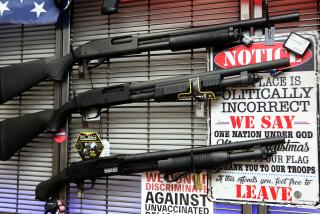Take a Double-Barreled Approach
- Share via
A recent poll shows Americans closely divided on whether the nation needs new gun laws or tougher enforcement of existing ones. It’s a false choice. Protecting our families requires both.
We believe in measures such as handgun licensing and registration, mandatory trigger locks and background checks at gun show sales. At the same time, we agree with those who argue for stronger gun law enforcement.
California has been a leader in enacting and enforcing weapons laws and imposing significant penalty enhancements on those who use guns to commit crimes. Yet clearly there is room for improvement.
A top priority that emerged from a recent summit we held was the need to create a systematic way to prosecute more of the roughly 4,000 “prohibited persons” in California each year who illegally attempt to buy guns from licensed dealers but are stopped by the mandatory background check.
Felons, violent misdemeanants and people with outstanding arrest warrants or restraining orders are prohibited from buying or possessing firearms. By walking into a gun store and falsely declaring on the Dealer Record of Sale form that they’re eligible to buy, these people break both state and federal laws. The problem is that, statewide, too few prohibited buyers are prosecuted for their attempt to obtain deadly weapons.
A better referral system is needed to make sure the California Department of Justice notifies prosecutors when gun buyers are rejected. Prosecutors, in turn, should evaluate each of these cases and press charges whenever possible. Requiring a thumbprint on the Dealer Record of Sale form would help win convictions.
Next, we need to create a regional gun center--a repository for information on gun crime--and a multi-agency gun trafficking task force to better coordinate investigations and prosecutions.
A regional gun center would essentially be a computerized database containing all firearm tracing, identification and gun crime information for Southern California. It would enable police to see both regional patterns and random links in gun trafficking and shootings that currently can’t be detected with the fragmented, paper-based records used by most departments.
We also need to deploy street resources more shrewdly. There are nearly 30,000 people on probation in Los Angeles County who, forbidden to possess firearms, are subject to warrantless searches and seizures for guns. Under a new program, the county Probation Department is able to target the most violent among them for increased scrutiny. Searches this year have yielded 17 assault rifles (including three fully loaded AK-47s), 24 handguns and seven rifles and shotguns. Nearly 50% of all probation searches discovered a violation or resulted in an arrest.
This tactic works, but with one probation officer for every 1,000 people on probation, we need more resources and closer cooperation between the Probation Department and police.
Next, we must close the ammunition loophole. Criminals and other prohibited persons aren’t allowed to possess guns or ammunition, and yet no system exists to prevent them from buying bullets over the counter. In the city of Los Angeles, where ammo buyers must sign a log and leave a thumbprint, we know for a fact that prohibited persons do buy bullets.
An annual $14 background check for ammo buyers would give teeth to the existing law. Los Angeles and San Francisco are considering such a system, but ideally, ammunition screening would be required at the state or federal level.
Congress also should pass proposed bills requiring firearm manufacturers to test-fire new guns, thereby establishing a national computerized database of ballistic “fingerprints.” Bullets or shell casings recovered at a crime scene could then be compared to images in the database, enabling police to identify the weapon that fired them. Today, the gun itself must first be recovered before ballistic fingerprinting can be used to match it with bullets or shell casings.
We also should assist detectives who combat gun trafficking with a federal provision that firearm manufacturers notify local law enforcement agencies about large gun shipments to federal firearm licensees.
A million moms have made it clear they’ll no longer tolerate inaction by political leaders as children are gunned down in schools, homes and playgrounds. While the sensible new laws they’re demanding would help reduce gun violence, so would tougher enforcement of gun laws already on the books.
More to Read
Sign up for Essential California
The most important California stories and recommendations in your inbox every morning.
You may occasionally receive promotional content from the Los Angeles Times.













